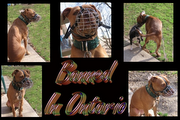Obedience is about more than power.
This excellent column was in the Vancouver Sun. It's these kind of stories we need to educate people about training and other types of stories, such as bite prevention, etc. People, from the dog owners themselves to those that don't have dogs need to be educated in order to lay the foundation of dog bite prevention.
When taken Shasta for training, we were taught the Wolf Pack Theory. We were amazed in our first lesson how our dogs understood what we were wanting them to do. It was as if we were being trained to a whole new theory that came natural for our dogs, but that owners needed to learn to have that understanding with their dogs.
All I know is that it works and I highly recommend it to all dog owners.
Obedience is about more than power
Your dog depends on you to guide it through human society
Moe Milstein, Vancouver Sun
Published: Monday, May 29, 2006
Pit bulls are back in the news this month. Chess, a two-year-old pit bull, is finally going to get his day in court. His owner, represented by lawyer Clayton Ruby, is arguing that Ontario's 2005 ban on pit bulls is too vague to be constitutional.
According to the law, pit bulls must be neutered, leashed and muzzled in public. Failure to comply can result in six months in prison or a $10,000 fine for the owner. Regardless of the outcome, the problems of aggression by dogs will remain.
Although the law was enacted to deal with the more catastrophic effects of aggression, veterinarians see variations of the problem on a daily basis where the victims are the owners of the dogs and, in a way, the dogs themselves.
Dr. Stanley Coren, a professor of psychology at UBC and a prolific writer on things canine, says: "The major problem with dog aggression is that people don't want to see it, nor do they want to believe it exists in their dogs."
Dogs attacking other dogs and people are clearly instances of aggressive behaviour. But veterinarians often see more subtle signs of aggression in their practice.
Bootsie develops an ear infection. It is itchy, sometimes painful, and drives her crazy. The veterinarian prescribes some eardrops that will give Bootsie relief in less than 24 hours. A week later, at the next office visit, the infection is worse. Bootsie's owner admits to not having administered the medication because "Bootsie wouldn't let me put the drops in."
Variations on the theme are many: eye drops, oral medication, bandages on paws, therapeutic baths -- in short, anything involving touching the animal becomes impossible with some dogs. When owners can't administer treatments, simple problems become uncontrollable with serious consequences for the dog.
There is something dysfunctional about this relationship. The dog is calling the shots. The caregiver is unable to properly care for his ward.
Traditionally, obedience in dogs was considered to be a contest of wills. Humans exerted their will by overpowering the dog. Methods used were a reflection of pedagogical principles of the time -- spare the rod and spoil the child.
Today, a more natural and humane approach has become popular, one that makes use of the hierarchical nature of the dog pack to assign roles. In this model, the handler becomes the alpha dog and power flows to him or her from this relationship.
This notion of hierarchy was most eloquently elaborated by an unlikely source. In New Skete, New York, a community of monks got involved in the breeding and raising of German Shepherds. Their methods were successful and led to the publication of several books.
The monks became a sort of underground phenomenon among those interested in dog training. Their basic concepts have now become mainstream and form the basis of most modern obedience programs.
How do you know who is top dog in your family? Here are a few tests.
- Can you touch any part of your dog's body without fear?
- Can you open its mouth and touch its teeth and gums?
- When you pass your dog in a narrow hallway, who gives way for whom?
- Can you step over your dog when it's lying down?
- Can you take food or toys away from it?
- Who goes through the door first?
- Will it get off the furniture when you ask it to?
- Can you reach for your dog when it is under a bed or table?
If you can't do these things with security, then your relationship needs work.
Obedience is not merely the exercise of power for its own sake. Dogs do not live in a natural environment. It is up to us to lead them through modern human society in a way that protects them and us.
blueridgevet@yahoo.com
Dr. Moe Milstein runs the Blueridge-Cove Animal Hospital in North Vancouver.
© The Vancouver Sun 2006






























2 comments:
Oh, I like this article.
Thanks for sharing Conners!
Me too. A POSITIVE, EDUCATIONIAL article for a change. This is what we need MORE of!
Post a Comment